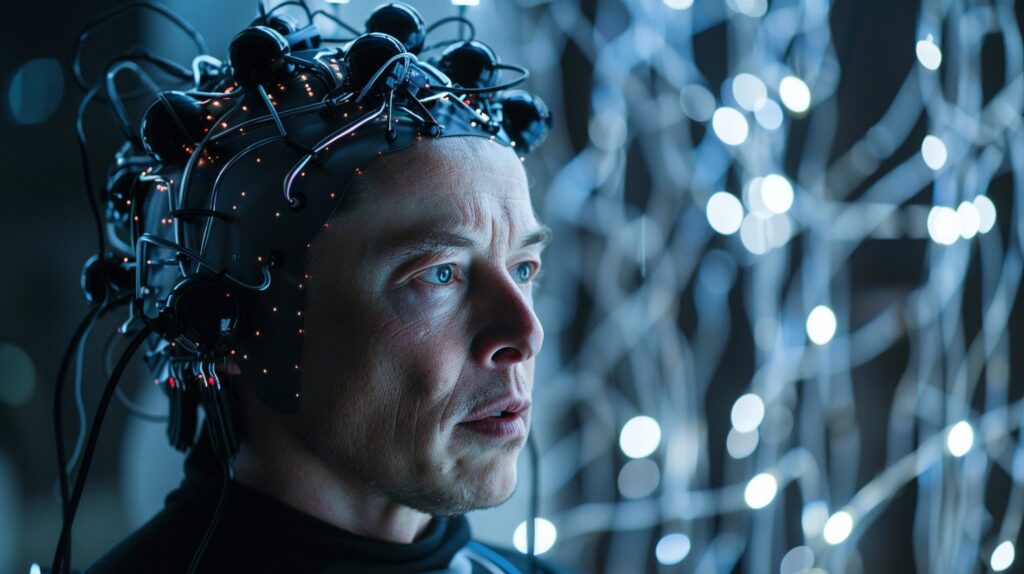Neuralink’s Leap into the Mind Raises Ethical Specters

Elon Musk’s Neuralink has made headlines by announcing the successful implantation of its first brain chip in a human subject. This event, taking place in San Francisco in early 2024, marks a significant milestone in medical science and neurotechnology, igniting a complex debate over the ethical implications of these advancements.
With the capability to restore lost sensory functions and enhance cognitive abilities, Neuralink steps into previously unexplored ethical areas, prompting critical discussions on privacy, autonomy, and the future of human identity.
The Technological Marvel and Public Sentiment

Neuralink’s breakthrough, featuring a device with 64 flexible polymer threads providing 1,024 sites for brain activity recording, signifies a major step in integrating human intelligence with machine precision. Targeted at improving human-computer interaction, this innovation offers hope to those with neurological conditions, setting the stage for a new era in our understanding and engagement with the human brain.
However, introducing such technology has elicited a wide range of public opinions. According to a Pew Research survey, although 77% of respondents favor using brain implants to improve mobility in paralyzed individuals and 64% support their use in treating age-related conditions, concerns remain about the broader implications of such technology.
The discourse around Neuralink’s advancements also brings into focus the responsibility of technology creators in addressing the societal and individual impacts of their inventions. With great power comes the need for equally significant ethical responsibility. As humans stand at the precipice of integrating advanced neurotechnology into everyday life, the dialogue between technology developers, ethicists, policymakers, and the public becomes increasingly critical. Ensuring that these technological advances benefit humanity while minimizing risks requires a collaborative effort to craft policies and guidelines that prioritize human welfare and ethical considerations.
Ethical Dilemmas and the Path Forward
The swift development of brain-computer interfaces like Neuralink’s chip highlights several ethical dilemmas. At the forefront is the concern over privacy and consent: the idea of technology that can access and potentially alter human thoughts raises significant alarm. A thorough examination of autonomy, consent, and privacy is crucial in addressing these ethical challenges.
It’s vital to establish detailed guidelines that consider these issues to ensure the responsible progression of neurotechnology. An industry expert, preferring to remain anonymous, emphasizes the dual nature of such technologies—their healing potential and the risk of misuse. “The impact of these technologies, for better or worse, is profound. It’s imperative to ensure their ethical development and application,” the expert states.
The introduction of brain-computer interfaces demands a reevaluation of ethical standards in technology and medicine. Beyond concerns of privacy and autonomy, there’s the issue of equity: ensuring fair access to these advancements across different socio-economic groups. The potential for creating disparities in cognitive abilities between those with and without access to such technologies calls for careful policy planning and social discourse. Balancing innovation with equity will be essential in harnessing the benefits of these technologies while minimizing societal divisions and fostering an inclusive future where everyone benefits from scientific progress.

Anticipating the Impact of Brain-Computer Fusion

As Neuralink plans for additional implants, aiming for 11 surgeries in 2024 and 27 in 2025, and projecting up to $100 million in revenue within five years, the societal effects of widespread brain chip adoption come into clearer view.
This analysis explores possible outcomes as the technology evolves, from improved learning and memory to the ethical concerns of a society split by access to cognitive enhancements. The discussion extends to the long-term goals for Neuralink and similar ventures, with the industry expert providing an analysis that looks to the future.
As Neuralink’s brain chips move closer to broader application, the discussion transcends technical achievements, urging a collective reflection on ethical governance. This next stage emphasizes the necessity for a dialogue that bridges technological advances with societal values, ensuring equitable access and safeguarding individual freedoms. The path forward hinges on creating policies that resonate with these principles, guiding the responsible integration of neurotechnology into daily life.
Reflecting on Neuralink's Path and Ethical Imperatives
Neuralink’s progress is indicative of the larger interplay between technology and ethics. As the industry expert succinctly says, “We are at the dawn of a new phase in human evolution. The choices we make now will determine our collective future.” This reflection encourages readers to consider the deep implications of integrating human consciousness with technology, highlighting the need for ethical consideration and public dialogue as we venture into unknown domains.



